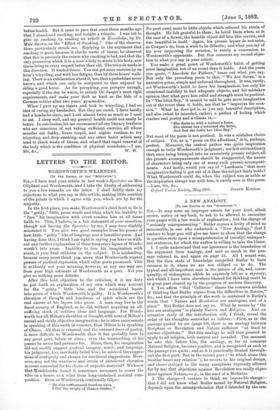LETTERS TO THE EDITOR.
WORD S WORTH' S WEAKNESS.
[To THE EDITOR OF THE " SPECTATOR:1
Bra,—I have read your article in last week's Spectator on Mrs. Oliphant and Wordsworth, and I take the liberty of addressing to you a few remarks on the latter. I shall boldly state my objections to what you say in this article, making little mention of the points in which I agree with you, which are by far the majority.
In the first place, you make Wordsworth's chief fault to lie in the "gritty," little, prose words and ideas which his inability to " fuse " his imagination with event renders him at all times liable to. This, I believe, is a fair statement of your assertion, though not having the Spectator by me, I may have slightly misstated it. You give two good examples from his poems of how little, "gritty" bits of language mar a beautiful poem. And having done this, I think I am right in saying you leave us with- out any further explanation of these temporary lapses of Words- worth's into prose. Inability to fuse his imagination with event, is your final criticism on the subject. It is misleading, because many must think yon mean that Wordsworth wanted powers of poetical expression which other poets possessed. This is evidently not your meaning, however, as any one may sees from your high estimate of Wordsworth as a poet. Yet you give us nothing more definite.
After this bold objection to the criticism, it is my duty to put forth an explanation of my own which may account for the " gritty " little bits, and the occasional lapses into prose of which Wordsworth is guilty. It is Wordsworth's elevation of thought and loneliness of spirit which are the real causes of his lapses into prose. A man may live in the finest scenery of England, as he did, without acquiring an all- sufficing stock of sublime ideas and language. For Words-. worth has all Milton's elevation of thought, with none of Milton's -carnal and richly objective imagination ; he is often more remote in speaking of this earth in summer, than Milton is in speaking of Chaos. All that is external, and the outward dress of poetry, is more difficult to Wordsworth than it has probably been to any great poet, before or since ; even the transcribing of his poems he never had patience for. Since, then, his imagination did not readily suggest poetical imagery, music, and language, his judgment, too, inevitably failed him ; he mistook the sugges- tions of contiguity and chance for emotional suggestions. More- over, may not the weariness and strain of unrelieved elevation account somewhat for his choice of unpoetic material? We know that Mendelssohn found it sometimes necessary to count the tiles on a house, as a relief from long-sustained musical com- position. Even so Wordsworth continually felt,- " Me this anthartered freedom tires,
I feel the weight of chance desires." No poet owed more to little objects which relieved his strain of thought. He felt grateful to them ; he loved them when, as in the case of a flower, the humble object did him this service, and was beautiful in itself. Again, his prosaic lapses do not arise,. as Cowper's do, from a wish to be didactic; and what you say of his ever improving the occasion, is surely a concession to Wordsworth's opponents. But this concerns my second objec- tion to what you say in your article.
You make a great point of Wordsworth's habit of getting more imagination out of an event than-it holds. And the poem you quote, " Anecdote for Fathers," bears out what you say. But only the preceding poem to this, " We Are Seven," is a narrative poem, simple and unforced throughout. It was, surely,. not Wordsworth's habit to force his imagination, but only his occasional inability to find adequate objects, and his mistaken opinion that what gave him relief and strength must be poetical. In " The Idiot Boy," it cannot be said he gets more imagination out of the event than it holds, nor that he " improves the occa- sion." What he does get is, as you say, beautiful description, and also (what he intended, rather) a pathos of feeling which reaches real poetry and a climax in,-
" She darts as with a torrent's force,
She almost has o'ertnrned the horse, And fast she holds her Idiot Boy."
But most of the poem is not poetical. It was a mistaken choice- of subject. Yet, as a " poem on the affections," it is, perhaps,. perfect. Moreover, the central pathos was quite inspiration enough to bribe Wordsworth's judgment ; nor is it extraordinary that, once being betrayed into an excessively prosaic Bubject, all the prosaic accompaniments should be exaggerated, the names of characters being only one of many such prosaic accompani- ments. And lastly, would .you say of " Laodomia," that more imaginative feeling is got out of it than the subject fairly holds? What Wordsworth could do, when the subject was as noble as the inspiration always was with him, is surely seen in this poem-
-I am, Sir, &c., Oxford Uaion Society, May 29th. Josxrn KINDON.














































 Previous page
Previous page